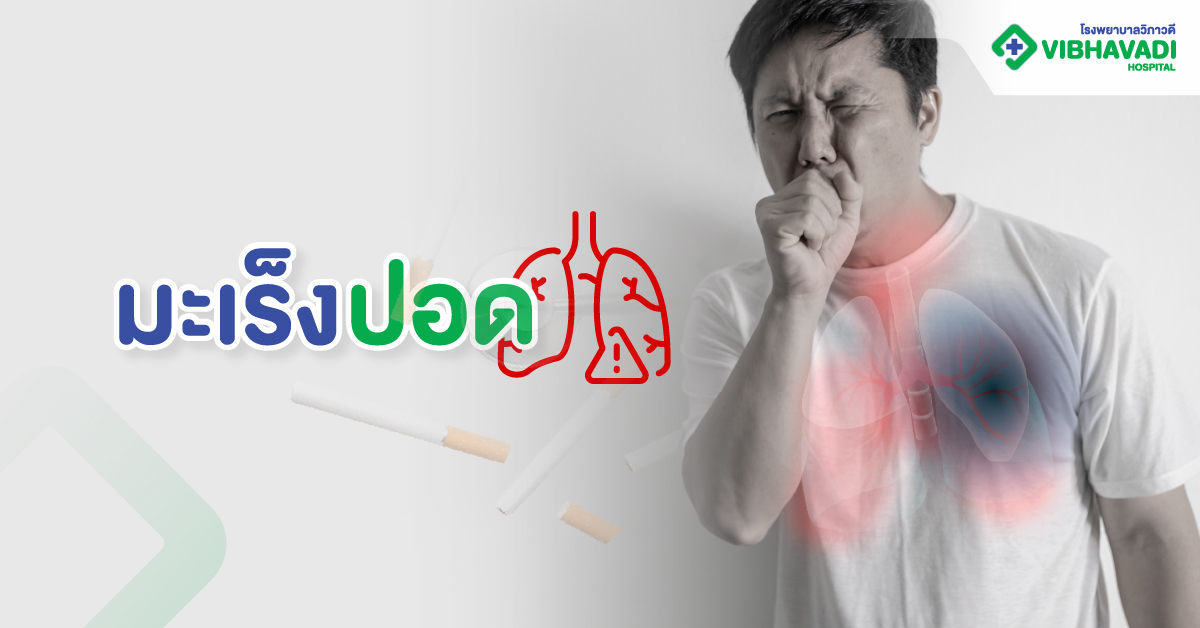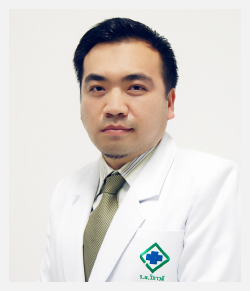Lung Cancer: Symptoms, Causes, Diagnosis, and Treatment

Overview
Lung cancer is one of the most prevalent and deadly forms of cancer worldwide. It originates in the lungs and can spread to other parts of the body if not detected early. At Vibhavadi Hospital, we provide comprehensive care for lung cancer patients, from early screening and diagnosis to advanced treatment and continuous support.
What Is Lung Cancer?
Lung cancer is a disease where abnormal cells grow uncontrollably in the lung tissue, interfering with the lung's function. There are two main types:
-
Non-Small Cell Lung Cancer (NSCLC): The most common type, accounting for about 85% of lung cancer cases. Subtypes include adenocarcinoma, squamous cell carcinoma, and large cell carcinoma.
-
Small Cell Lung Cancer (SCLC): More aggressive and fast-spreading, usually linked to smoking.
Symptoms of Lung Cancer
Lung cancer symptoms may not appear until the disease is advanced. Common signs include:
-
Persistent cough that worsens over time
-
Coughing up blood or rust-colored sputum
-
Shortness of breath
-
Chest pain that worsens with deep breathing or coughing
-
Hoarseness
-
Unexplained weight loss
-
Loss of appetite
-
Fatigue or weakness
-
Recurrent respiratory infections such as bronchitis or pneumonia
If you experience these symptoms, especially if you are at high risk, seek medical evaluation promptly.
Causes and Risk Factors
Primary Causes
-
Smoking: The leading cause, responsible for about 85% of cases.
-
Secondhand smoke exposure
-
Exposure to radon gas, a naturally occurring radioactive gas
-
Occupational exposure to carcinogens such as asbestos or arsenic
-
Long-term exposure to air pollution
Additional Risk Factors
-
Family history of lung cancer
-
Previous radiation therapy to the chest
-
Age over 50
-
Chronic lung diseases such as COPD
Stages of Lung Cancer
Lung cancer is categorized into stages based on tumor size and spread:
-
Stage 0: Abnormal cells found only in the lining
-
Stage I: Cancer confined to the lungs
-
Stage II–III: Spread to lymph nodes or surrounding tissues
-
Stage IV: Cancer has spread to other organs (metastasis)
Accurate staging is essential for effective treatment planning.
Diagnosis at Vibhavadi Hospital
Early and accurate diagnosis greatly improves treatment outcomes. At Vibhavadi Hospital, we use the following diagnostic techniques:
Imaging Tests
-
Chest X-ray
-
CT Scan
-
PET Scan to detect spread
-
MRI for brain metastases
Laboratory and Biopsy Tests
-
Sputum cytology
-
Bronchoscopy to collect tissue samples
-
Needle biopsy guided by CT or ultrasound
-
Molecular testing to identify gene mutations such as EGFR, ALK
Treatment Options
Treatment depends on the type, stage, and overall health of the patient. At Vibhavadi Hospital, we provide individualized, multidisciplinary treatment plans that may include:
Surgery
-
Lobectomy: Removal of one lobe of the lung
-
Pneumonectomy: Removal of the entire lung
-
Segmentectomy or wedge resection: Removal of a small portion of lung tissue
Radiation Therapy
-
Uses high-energy rays to destroy cancer cells
-
Often used for localized tumors
Chemotherapy
-
Uses drugs to kill cancer cells throughout the body
-
May be combined with surgery or radiation
Targeted Therapy
-
Blocks specific mutations in cancer cells
-
Common for tumors with EGFR, ALK, or ROS1 mutations
Immunotherapy
-
Stimulates the body’s immune system to attack cancer cells
-
Examples include nivolumab and pembrolizumab
Supportive and Palliative Care
For advanced cancer, we provide:
-
Symptom management including pain and breathing issues
-
Emotional and psychological support
-
Palliative treatments to improve quality of life
Lung Cancer Screening
Who Should Get Screened?
-
Adults aged 50–80 with a history of heavy smoking
-
Current smokers or those who quit within the last 15 years
Screening Test
-
Low-dose CT scan (LDCT) is the recommended test
-
Helps reduce lung cancer mortality by up to 20%
Lung Cancer Care at Vibhavadi Hospital
We provide world-class care for lung cancer patients with:
Multidisciplinary Team
-
Pulmonologists, oncologists, thoracic surgeons, radiologists, and pathologists
State-of-the-Art Facilities
-
Advanced imaging systems and surgical technology
Personalized Treatment Plans
-
Tailored to cancer type, genetic profile, and patient preference
Psychosocial Support
-
Counseling and mental health services for patients and families
Appointment and Contact Information
To book an appointment:
-
Website: www.vibhavadi.com
-
Phone: 0-2561-1111
-
Clinic: Cancer Center / Pulmonary Center
-
Operating Hours: Monday to Saturday, 8:00 AM – 8:00 PM
Insurance and Treatment Costs
Vibhavadi Hospital collaborates with various insurance providers. Coverage may include:
-
Diagnostic testing
-
Surgery
-
Chemotherapy and radiation
-
Outpatient and inpatient services
For precise cost estimates and insurance eligibility, please contact our billing department.
Frequently Asked Questions (FAQ)
Q1: Is lung cancer treatable?
Yes. Lung cancer is treatable, especially when detected early. Surgery, chemotherapy, radiation, and targeted therapy are common options.
Q2: Can non-smokers get lung cancer?
Yes. Non-smokers can develop lung cancer due to factors such as radon exposure, genetics, and air pollution.
Q3: What is the survival rate for lung cancer?
Survival rates vary by cancer type and stage. Early detection significantly improves outcomes.
Q4: What are common side effects of chemotherapy?
Side effects include fatigue, nausea, vomiting, hair loss, and increased infection risk. Supportive care is provided.
Q5: How often should high-risk individuals undergo lung cancer screening?
Annual low-dose CT scans are recommended for high-risk individuals aged 50–80.
Testimonials
Proud to take care of you






